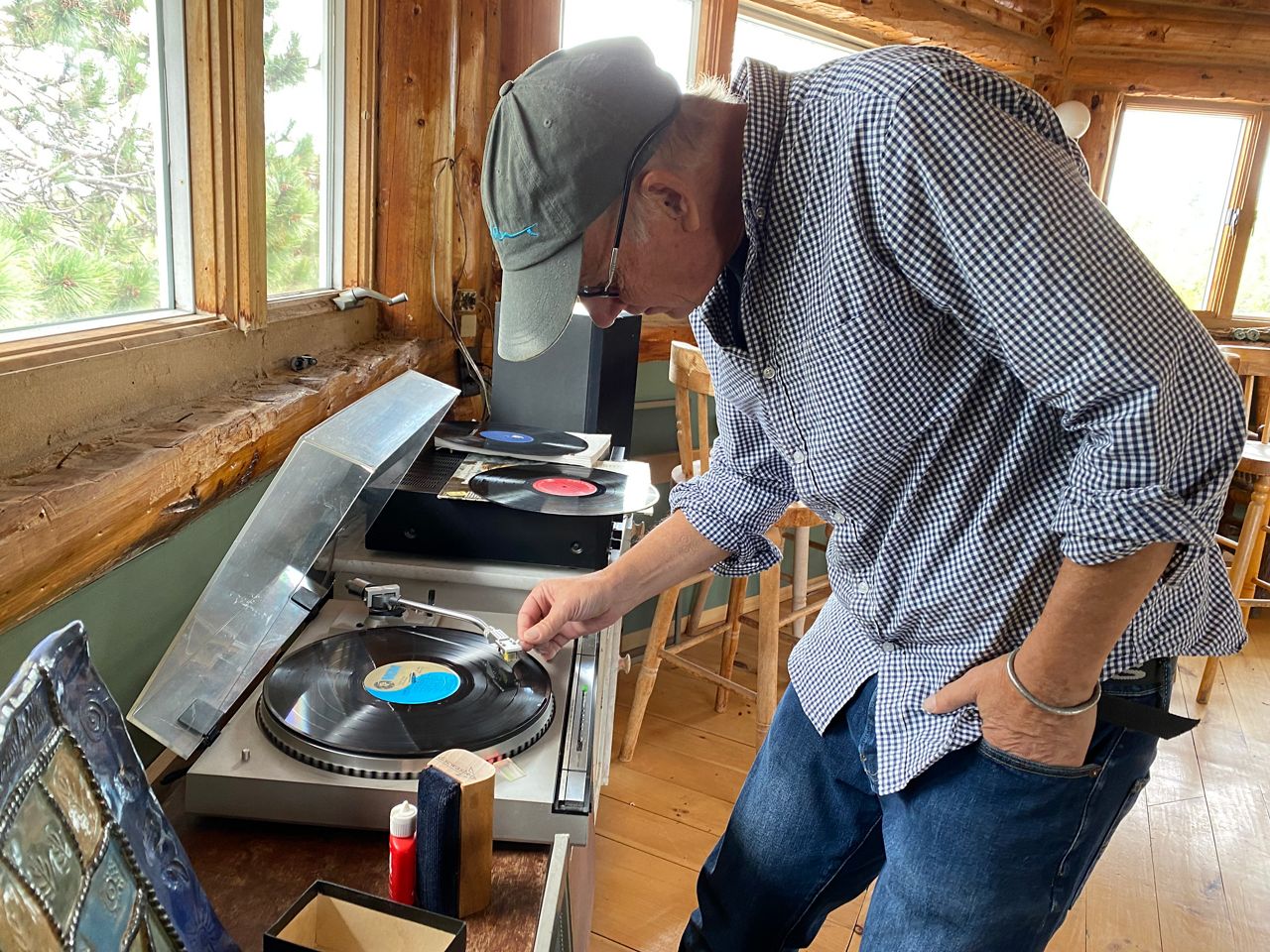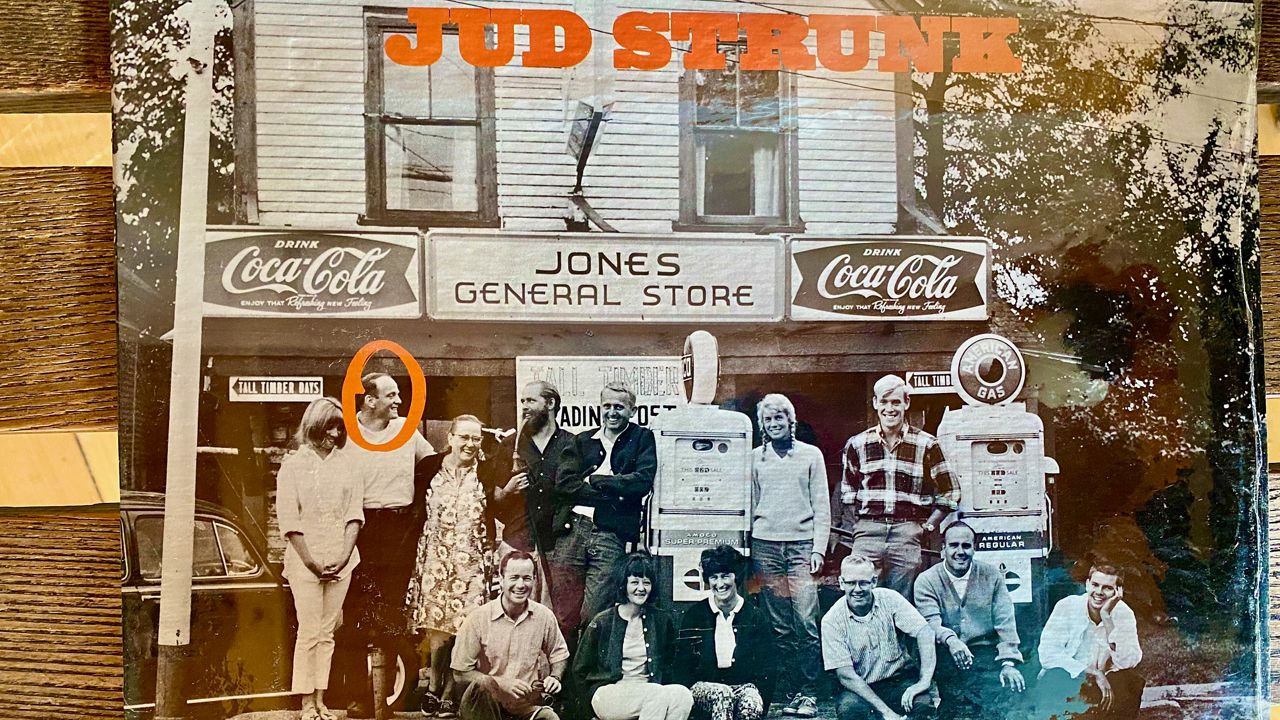To this day, Maine comedian Tim Sample has a poster hanging on his office wall for a show that never happened – at least not as advertised.
Dated Oct. 26, 1981 it promoted a gig he and Maine humorist Marshall Dodge were scheduled to do “with special guest Jud Strunk.” It would have been Sample’s first time performing alongside Strunk, someone he considered a mentor.

Sample had watched Strunk on network television’s “Rowan & Martin’s Laugh-In” in the early 1970s and several weeks before their scheduled show, spent the night at his log cabin in Eustis.
But 40 years ago today, on Oct. 5, 1981, Strunk was piloting his WWII era plane when it crashed shortly after take-off, killing him and his passenger, local businessman Richard Ayotte. Strunk was 45 and Ayotte was 43.
The singer/songwriter/comedian, best known for his 1973 Billboard Top 20 hit “Daisy a Day,” also had three humorous songs make it onto the country music charts: “Next Door Neighbor’s Kid,” “The Biggest Parakeets in Town” and “Pamela Brown.” On Laugh-in, he played a sportscaster delivering the news from “the sports capital of Farmington, Maine.”
“He was a very eclectic character,” Sample said last week. “I had seen him on network TV and at the time that was like holy catfish.”
Strunk appeared on the “Merv Griffin Show,” “Hee Haw” and “Bewitched.” He played the banjo and sang “Daisy a Day” on the “Tonight Show” starring Johnny Carson and toured with Andy Williams. He performed with Jim Neighbors, Burt Bacharach, Vikki Carr and Petula Clark.
Sample said he admired Strunk for his ability to get the audience to come along with him as he juggled humor and love songs like “Daisy a Day.”
“The essence of performing is to form this unbreakable bond with the audience,” Sample said. “Jud could do that amazingly. He had some pretty bawdy, off-color stuff but he could shift gears and suddenly you’re in the land of mom, apple pie and Chevrolet and everybody is sobbing.”
That same sentiment – Strunk’s ability to have his audience laughing one minute and crying the next – was part of a tribute written by Maine Journalism Hall of Famer Ann McGowan, a reporter and editor at Morning Sentinel, a few days after Strunk’s death.
“There was a magic about Jud Strunk,” she wrote. “He wasn’t just a writer of poems, or a writer of songs, or a singer, or a banjo player, or a Maine humorist. He was all of those things and more. He was an entertainer who evoked emotions.”
Even four decades later, Strunk continues to leave a legacy with his three sons who all live and work in Maine – Rory, 60, CEO of O’Maine Studios in Portland; Jeff, 59, an inventor and co-owner of The Rack at Sugarloaf and Joel, 57, a filmmaker in Union.
Many in western Maine will also recognize Mason Strunk, a University of Maine at Farmington student who has performed his grandfather’s songs and poems on stage since he was 7.
In 1985, four years after his death, Jud Strunk was inducted into the Maine Country Music Hall of Fame in Mechanic Falls. Alongside Maine country music legends Dick Curless, Ken Mackenzie and Hal Lone Pine, is a plaque, photo, 45-record, and a poem written by Strunk.
“Quite a talented man,” said Slim Andrews, 90, also a Hall of Famer, during a recent tour. “Great guy.”
Rory Strunk said his dad – a native of Jamestown, New York and 1959 Virginia Military Institute graduate — worked in Maine as a salesman for True Temper skis and also for the U.S. Ski Team, based out of Kingfield.
“Dad comes from New York, moves up here, completely embraced the Maine culture and adopted in his art the humor and the stories from this wonderful corner of the world and made a career out of it,” he said.
Jud Strunk’s big break came when Sylvester “Pat” Weaver, former NBC president, saw him perform in Sun Valley, Idaho.
“He tracked him down on a ski lift and signed him to a contract and suddenly he was locked into the entertainment world,” Rory Strunk said.
In one of his Laugh-In skits still available on YouTube, Strunk is the “Farkel Friend Who Wouldn’t Shut Up.” Dressed in khakis, a tan shirt, a flannel jacket, knee high rubber boots and wearing a whistle around his neck, he walks in and says “Hi I’m Frank’s friend from Farmington.”
Then for 1-minute straight Strunk speaks using words that almost all start with the letter “f.”
“My father’s father Fred was a first family founding father of Farmington and one of the few farmers who fed his flocks and fertilized his fields with Frank Faulkner’s famous fodder,” he begins, struggling at times not to laugh.
While Strunk performed comedy and wrote funny songs, his biggest hit is the love song “Daisy a Day,” in which a man gives his wife a flower every day, even after she dies.
“It’s kind of a wedding ballad, it’s a letting go ballad,” Rory Strunk said. “That’s the kind of story, the song, that will never get old.”
In 1982, country star Glen Campbell sang another of Strunk’s ballads called “Ruth.”
“This song was written by a friend of mine by the name of Jud Strunk, a great talent who the world lost too early,” Campbell said in a video recording of the song. “It’s about a girl that meant a lot to him and I hope they are listening now. It’s called ‘Ruth.’”
Strunk also had a talent for capturing a kind of bygone America, as he did in “Bill Jones General Store,” which he introduces on his album as a place just outside of Stratton, Maine with a sign that reads “if we ain’t got it, you don’t need it.”
“I can hear the creakin’ of the rusty old screen door, smell the penny candy at Bill Jones General Store, the pipe smoke and tobacco, wet boots on the floor, Campbell’s soup and shotgun shells at Bill Jones General Store,” he sang.
On a moody October day last week, Rory’s younger brother Jeff pulled old vinyl albums out of their sleeves, carefully cleaning them before dropping the needle down. He wanted to share his dad’s music, playing a serious song called “Jacob Brown” and the silly song “Self-Eating Watermelon.”
As he sat inside the log home his dad built by hand in the 1970s, Jeff Strunk recalled one his favorite memories – that time his dad jumped out of the band’s van somewhere near Fargo, North Dakota and hitchhiked to a Native American sweat lodge in Canada.
Jeff, a teenager at the time, continued to travel with the band as they headed to Wisconsin for the Great Northern Bluegrass Festival.
As Jeff recalls, he and the band arrived at the gig and expected Jud to show up any minute. Rory had driven over for the show and as they waited for their dad to arrive, they saw a plane flying low over the stage.
“Did you see dad’s bald head?” Jeff said he asked Rory. “I think that’s him.”
Strunk had hired a stunt pilot to do spins and loops over the field of thousands of fans. After the plane landed nearby, he caught a ride on a motorcycle that dropped him off right on stage.
“It’s one of my fondest memories,” Jeff said. “It was just so classic rock star stuff.”
Just a few years later, Jud Strunk would be piloting the vintage military plane that crashed at the base of Sugarloaf Mountain, killing him and his passenger.
Earlier that day, Jeff went up in the open cockpit 1940’s plane for a ride with his dad. But Jeff said he started to feel airsick, so his dad landed the plan and Ayotte – a friend of Strunk’s and owner of a store in Carrabasset Valley — jumped in. They weren’t far off the ground when there was engine trouble, which Jeff believes caused his father to have the heart attack that led to the crash.
Rory was away at college when he heard about the accident. He took a semester off to deal with the loss and all of the painful things that go with it.
“Ultimately, what was really neat about it was dad had this beautiful legacy of songs and poems he wrote,” he said.
A book of poems called “Bury me on the Wind” and the song “Ruth” were “like healing medicine for a young person like myself at the time.”

The poems inspired Rory, his brother Joel and one of their friends to crisscross the country with their dad’s ashes to scatter them in his favorite places. The summer after he died, they drove their father’s 1974 Volkswagen Thing to several places including a ski jump in Michigan, the Badlands in South Dakota, Colorado and down to Texas.
“It was a way to celebrate my dad’s life that was meaningful and healing,” he said.
As he looks back on his dad’s life and career, Jeff Strunk thinks of a Maine storyteller.
“He loved Maine so much,” he said. “He brought Maine to the big screen, to be nationally known as a place in the 1970s. I think his legacy to Maine is that his songs and his stories are spun from experiences from friends, experiences in Maine.”
Three weeks after his death, Sample and Dodge still performed the Oct. 26, 1981 show at the Waterville Opera House, although it became a benefit for Strunk’s family.
Sample said he can look back and appreciate Strunk for his “raw creative energy that was just infectious.”
“One of the great gifts of true creative geniuses is childlike enthusiasm unbridled by practical considerations,” Sample said. “Jud had that quality. That wonderful sense if you think it, if you dream it, it can be done.”








